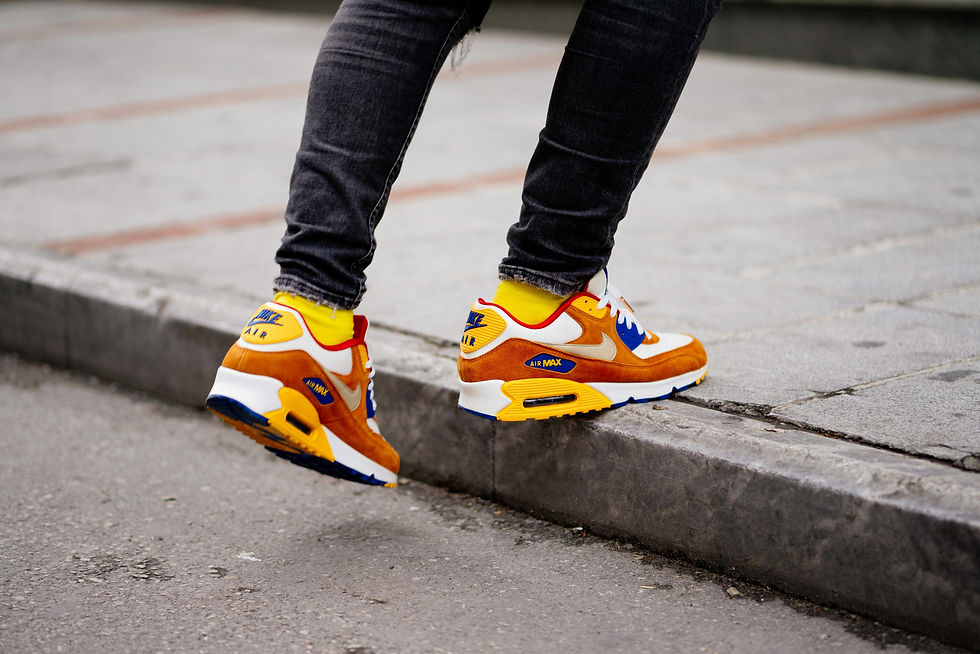Nagging Heel Pain? Your Summer Shoes Might be to Blame
- Sam Chetwood

- Jul 22, 2025
- 3 min read
Understanding Plantar Fasciitis and the Importance of Choosing the Right Shoes for You and Your Child

Have you been experiencing heel pain? Particularly first thing in the morning?
You're not alone.. this time of year, we hear about a lot of people struggling with sore feet and the most common culprit is plantar fasciitis.
It’s a painful, frustrating condition that tends to flare up when we swap structured, supportive shoes or boots for lighter, flimsier summer options, like flip flops and slides.
What Exactly Is Plantar Fasciitis?
The Plantar fascia is a thick band of tissue that connects your heel to your toes and supports the arch of your foot. This area of the foot takes a lot of strain during daily life, helping it function and absorbing shock as you move around. But if it gets overstretched or stressed, it can become irritated and inflamed, leading to pain and discomfort, particularly around the heel. This is plantar fasciitis.
It’s often worse:
First thing in the morning
After sitting for long periods
When you've just finished exercising (rather than during)
You might feel a sharp stab, a dull ache or even a burning sensation under your heel.
Why Is It So Common in Summer?
One of the biggest triggers? Poor footwear. Flip flops, slides and other lightweight summer sandals provide little to no support and don’t hold the foot in place. Toes end up gripping with every step to keep the shoe on, overworking and straining the muscles of the foot.
Combine that with changes to routine, increased activity or more repetitive movements and it’s easy to see why summer is prime time for plantar fasciitis flare-ups.
Other risk factors include:
Walking barefoot for long periods, if your feet are used to structure and support
Pregnancy or weight gain
Flat feet or high arches
Ill fitting or worn-out shoes
What You Can Do If You’re Suffering
The good news is that most cases can be treated at home with a bit of patience and care:
Rest: Give your feet a break from high-impact activity.
Ice: Apply an ice pack to the heel area to reduce inflammation.
Massage: A tennis ball or frozen bottle rolled under the foot can help release tension.
Supportive footwear: Ditch the flip flops for shoes or sandals that give more support and some cushioning around your heel while your feet recover.
Pain relief: Over-the-counter anti-inflammatories can help if needed.
If symptoms persist or worsen, it's worth seeking professional help from a podiatrist or your GP.
What About Children?
While plantar fasciitis is more common in adults, children can experience similar heel pain, often due to repetitive activity, poorly fitting shoes or a condition called Sever’s disease (a common cause of heel pain in active children around puberty).
It's yet another reason for children to wear properly fitted footwear year-round. Their feet are growing and developing rapidly, shoes that are too tight or too loose and don’t support the natural movement of their feet can lead to problems not just now, but well into adulthood.
A well-fitting pair of shoes help:
Encourage good posture and alignment
Support natural movement and balance
Prevent long-term issues like foot pain, bunions or restricted mobility
Choose Shoes That Support Your Family’s Health
Whether it’s you or your little one suffering, the advice is the same… your shoes matter. The wrong footwear can cause more than just short-term discomfort, it can affect your overall health and wellbeing.
At CeCe & Me, we really care about helping you find shoes for your little one that feel great and support the healthy development of their feet. From first walkers to school shoes, we’re here to offer expert guidance so your children, and you, can stay active, pain-free and build a strong foundation.
Find your nearest CeCe & Me shoe fitter here.




Comments